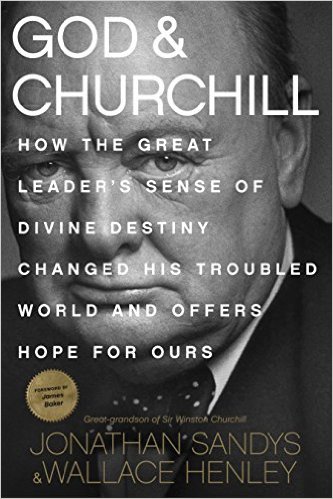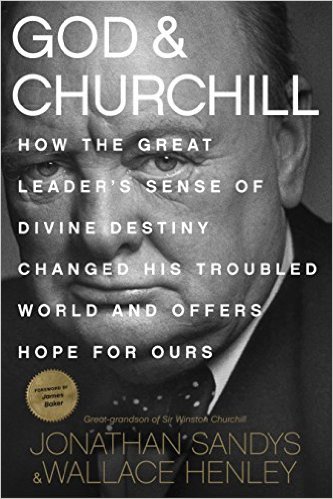
Finest Hour 172
Books, Arts, & Curiosities – Divine Intervention?

June 12, 2016
Finest Hour 172, Spring 2016
Page 48
Review by Robert Courts
Jonathan Sandys and Wallace Henley, God & Churchill, Tyndale Momentum, 2015, 352 pages, $26.99. ISBN 978-1496406026
 When St Martin’s Church, Bladon decided to install a stained glass window to commemorate the fiftieth anniversary of Churchill’s death, the most thorny question was how to commemorate—in a Church—a man who, whilst undoubtedly the saviour of Christian civilisation, was in no intellectually honest sense a Christian. In trying to grapple with that question, the authors of this book make two radical, but ultimately unconvincing, arguments.
When St Martin’s Church, Bladon decided to install a stained glass window to commemorate the fiftieth anniversary of Churchill’s death, the most thorny question was how to commemorate—in a Church—a man who, whilst undoubtedly the saviour of Christian civilisation, was in no intellectually honest sense a Christian. In trying to grapple with that question, the authors of this book make two radical, but ultimately unconvincing, arguments.

2025 International Churchill Conference
First, the authors appear to argue that Churchill was—sort of—a Christian. It was just that he did not realise it himself. Sandys develops this argument more candidly on his blog (which you can find here) where he makes the startling claim, “Churchill not only believed in God and the words in the Bible…his faith was foundational to his character and leadership.” Thus, Churchill quoted the Bible because it formed part of his psychological foundation. Perhaps it did, but he also quoted Shakespeare and Tennyson; because he loved literature. Further, it is counterintuitive to suggest that Churchill’s opposition to Nazism was because of Mrs. Everest’s Biblical lessons, rather than a long-established humanity and geopolitical understanding. Churchill simply valued the morality that underpinned Western life and recognised that as stemming from Christianity. But that did not make him a Christian, be that as a “religious pietist” or otherwise.
Secondly, the authors argue that Churchill was an agent of God’s will, and that the story of his life reveals the hand of divine destiny. Thus when Churchill narrowly missed being shot in Cuba, it was because he was being spared. Or when he dislocated his shoulder in India, it was to ensure that he fought with gun, not a sword at Omdurman, and thus avoided death. The authors can of course argue that, if you believe in God’s omnipresence and divine plan, who is to say that was not the case? It is of course impossible to prove a negative. But narrowly avoiding being shot in battle is a story that every soldier can tell, and it does not prove that God was sparing Churchill. Further, if we are to accept that God’s hand brought Churchill into being and sustained his existence to deal with Hitler, then we also have to grapple with the uncomfortable fact that He appears also to have sustained Hitler—who also had many close brushes with death— simply to give Churchill someone to defeat. That may appear to be rather a twisted game to the sixty million who died in the Second World War. Further, this leaves aside the even more uncomfortable fact that Stalin—as close to a human Antichrist as it is surely possible to invent—had just as much a leading role. Why was not Stalin the man sent by God to prepare the way for “the ultimate Deliverer”?
In these twin points lies the ultimate weakness of this book. The “moments of destiny” do not justify the authors’ claims, and there is little attempt at serious theology herein, apart from some references to the Bible in the central section with tendentious references to Churchill’s character.
It is painful to criticise a book that clearly means so much to the authors. Sandys in particular states that he has suffered “setbacks, that shattered [his] innocence about the World” and that “something had to change to get [his] life back on track. That change began…when I ‘met’ Winston Spencer Churchill.…” Clearly, if a person wishes to believe the romantic notion that, through the smoke and dust of 1940, we can see the goodness of God’s hand at work, then that is inoffensive enough. Certainly, to overcome personal difficulties by following Churchill’s example is something every Churchillian would endorse. However, to enlist Churchill as some kind of unwitting Christian, a “God-haunted” man, is against anything that he ever wrote or said. Churchill never went any further than a vague belief in some kind of Higher Power, and in the value of “Christian ethics.” It is a bridge too far to argue that, simply because he did good work, “Winston Churchill was a deliverer prepared and brought onto the human scene through a sovereign act of God to counteract the work of Adolf Hitler.”
The back cover states that this is a “book for Christians as well as Churchill enthusiasts.” Both would be better with Andrew Roberts’ essay “Churchill and Religion” (Finest Hour 163). It is shorter. It is deeper. And it is closer to the mark.
Subscribe
WANT MORE?
Get the Churchill Bulletin delivered to your inbox once a month.



